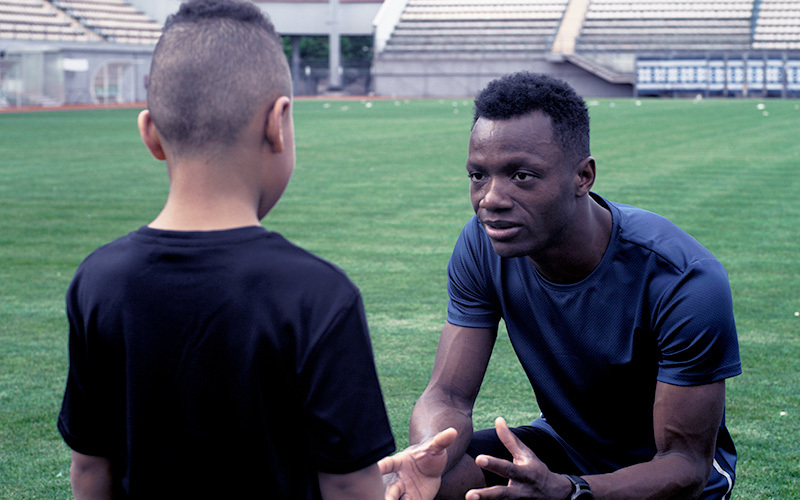When athletes have bad days: Tips for athletes and parents

No matter how hard they work, every athlete has bad days. Whether it’s a stumble, fumble, or outright loss, disappointment is a reality of sports.
“No one likes the feeling of failing,” says Kelsey Griffith, mental skills specialist at The Micheli Center for Sports Injury Prevention. “But experiencing those emotions is part of the athletic process.”
The trick is being able to analyze what went wrong without feeling like a failure as a person. Here we talk to two experts from Boston Children’s Sports Medicine Division about constructive ways athletes can process bad days, and how parents can help.
Learning from bad days
“Overcoming adversity in sports can teach kids how to overcome adversity in life,” says Dr. Miriam Rowan, psychologist with the Sports Medicine Division. Failure in sports can foster resilience and the ability to persevere in the face of setbacks. Being resilient tends to serve kids well through life’s many ups and downs.
When it comes to improving performance, failure is fuel.”
Kelsey Griffith
Bad days can also help athletes, including performing artist athletes, identify areas they need to work on to improve their results.
“As one of my athletes once said, ‘Good days are good memories. Bad days are good information,’” says Griffith. While good days can boost an athlete’s confidence, bad days can motivate them to work on their skills. “When it comes to improving performance, failure is fuel.”
Putting bad days in perspective
The challenge, however, is not letting a bad day, or even a string of bad days, cast a shadow over an athlete’s sense of self.
The athletic process: Setting goals, working hard, and seeing progress, helps many athletes build self-esteem. But a person who values their athletic performance above all else will have little emotional cushion when bad days happen.
A child whose athletic identity defines their whole identity is more likely to feel unworthy as a human being when they fail.”
Dr. Miriam Rowan
“A child whose athletic identity defines their whole identity is more likely to feel unworthy as a human being when they fail,” says Dr. Rowan. Spending too much time wishing things could have been different or dwelling on thoughts like, ‘If only I’d kept my eye on the ball,’ makes it much harder to move forward.
Accepting reality — that what happened, happened even if they wish it didn’t — can help. “If an athlete can say to themselves, ‘OK, that happened. It’s done. How do I redirect my focus?’ they’ll have an easier time moving on,” says Griffith.
Competitiveness and mental health
Putting everything on the line for the team (or the win or a performance) can teach athletes the value of persistence, dedication, and teamwork. But such thinking can also go too far. The win-at-any-cost mentality, which is sadly widespread in many sports, puts athletes’ physical and mental health at risk.
“That rigid mentality tells athletes their primary value is winning. It tells them that the outcome of a game is more important than anything else, including who they are as a person, their relationships, or their ability to connect with others,” says Rowan.
It also takes the fun out of sports, replacing it with anxiety and fear. But having fun in sports typically improves athletic performance. “Athletes who are having fun, who play because they love the sport, have more internal motivation,” says Griffith. Playing in a state of extreme stress makes athletes more likely to choke.
Dos and don’ts for parents when their athlete has a bad day
Parents can help athletes process their emotions after a loss or disappointment. They may need to ignore their first instincts, however. “It’s natural for a parent to want to make things better, but their child might need space to feel crummy for a bit,” says Griffith.
DO
- Give your child time to feel their feelings.
- Let your child do most of the talking.
- Let your child know you love and accept them unconditionally.
- Validate your child’s feelings. It might be as simple as putting a hand on their back or recognizing their discontent.
- Ask leading questions like, “When you’re ready, do you want to talk about what happened?” or “What are you going to work on?”
- Remind your child that everyone has bad days, even pro athletes. A bad day is a moment in time, not a reflection of who they are as an athlete or as a person.
DON’T
- Try to problem solve. If a child is beating themselves up, suggesting how to make things better will probably backfire and make them feel worse.
- Be overly positive. If you tell your child “It’s OK,” when they feel anything but OK, they might interpret that as you not wanting to listen to them.
- Be overly critical. Athletes know when a game or play goes badly. Telling them what they did wrong doesn’t help.
- Skip your post-game routine (if you have one). If you usually go out for ice cream after a game, do maintain that ritual.
It can be hard to know what to say after a game or practice goes poorly. It’s especially difficult when emotions are running high. Try to set expectations in advance. Ask your child what they need from you if they’re upset about a game or practice. They may want time to process their feelings, or they may want words of comfort. The best way to find out is to ask.
Learn more about the Sports Medicine Division and The Micheli Center for Sports Injury Prevention or book an appointment.
Related Posts :
-

Keeping sports fun: Preventing burnout in young athletes
It’s easy to tell when a kid loves sports: Maybe they practice drills in the driveway until it’s ...
-

Early sports specialization: How to support your child
Early sports specialization — intensive training and competition in a single sport at the expense of other activities — has become the ...
-

Not just a physical thing: The psychology of sports injuries and recovery
“Nobody plays sports expecting to get injured, but unfortunately, injuries are part of sports,” says Melissa Christino, MD. As a ...
-

Teens, anxiety, and depression: How worried should parents be?
Part of the work of being a teenager is making connections outside of the family and becoming attuned to world ...





